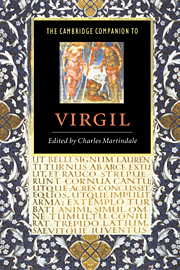Book contents
- Frontmatter
- Contents
- List of illustrations
- List of contributors
- Preface
- 1 Introduction: ‘The classic of all Europe’
- Part 1 Translation and reception
- Part 2 Genre and poetic career
- Part 3 Contexts of production
- Part 4 Contents and forms
- Dateline compiled by Genevieve Liveley
- List of works cited
- Index
- Plates
1 - Introduction: ‘The classic of all Europe’
Published online by Cambridge University Press: 28 May 2006
- Frontmatter
- Contents
- List of illustrations
- List of contributors
- Preface
- 1 Introduction: ‘The classic of all Europe’
- Part 1 Translation and reception
- Part 2 Genre and poetic career
- Part 3 Contexts of production
- Part 4 Contents and forms
- Dateline compiled by Genevieve Liveley
- List of works cited
- Index
- Plates
Summary
The Irish poet Seamus Heaney's Seeing Things was first published in 1991, to immediate acclaim. The collection is framed by translations of two passages of canonical poetry, Virgil's account of Aeneas' consultation of the Sibyl and the instructions he receives from her about finding the golden bough, often read as a symbol of wisdom and initiation, prior to his descent into the Underworld, and Dante's meeting in Inferno 3 with Charon the ferryman of Hell, itself inspired by another episode in Aeneid 6. The first original poem in the book, 'The journey back', describes an encounter with a more immediate poetic predecessor, Philip Larkin, whose shade quotes from Dante and describes himself as 'A nine-to-five man who had seen poetry'; the piece resonates with earlier poetic meetings, T. S. Eliot's with the 'familiar compound ghost' in part two of 'Little Gidding' and - one of Eliot's intertexts here - Dante's with the shade of Virgil at the outset of the Divine Comedy. In his new pursuit of the visionary Heaney was also coming home to some of the most influential traditions of Western poetry. Five years later Heaney is a Nobel Laureate, and Seeing Things is already in Britain an A-level set text. Successful canonisation can be achieved with surprising rapidity - the Aeneid itself, greeted (according to some with a degree of irony) by the elegist Propertius in advance of its publication as 'something greater than the Iliad', almost instantly became a school text, and part of the furniture of the minds of educated Romans.
- Type
- Chapter
- Information
- The Cambridge Companion to Virgil , pp. 1 - 18Publisher: Cambridge University PressPrint publication year: 1997
- 2
- Cited by



